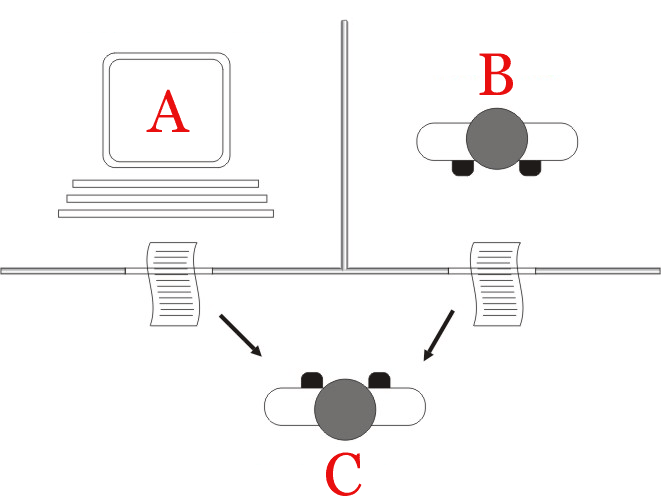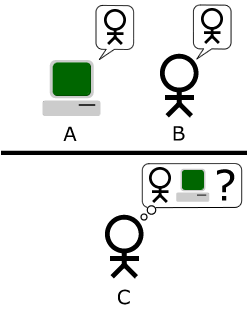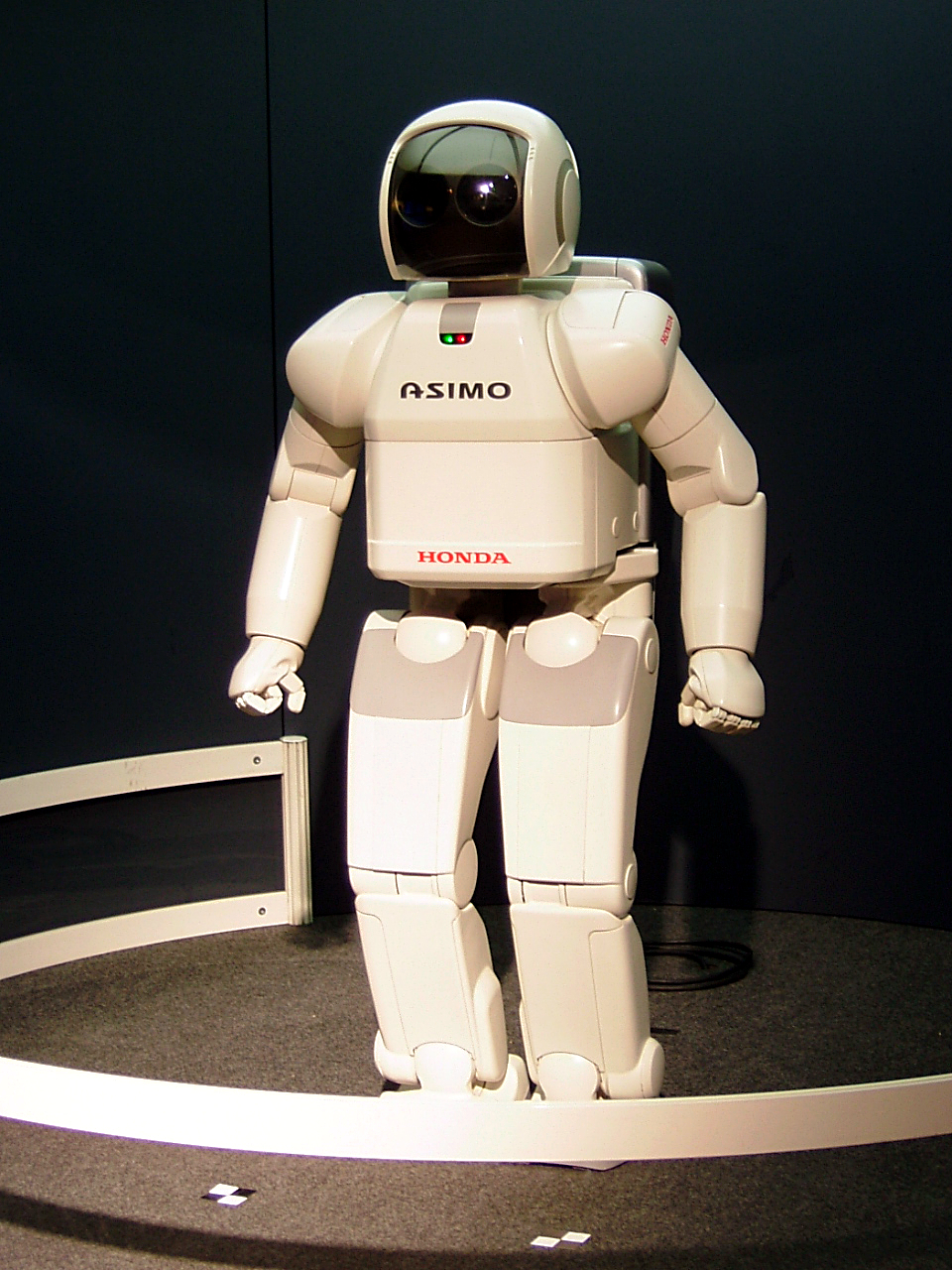|
James H. Moor
James H. Moor is the Daniel P. Stone Professor of Intellectual and Moral Philosophy at Dartmouth College. He earned his Ph.D. in 1972 from Indiana University. Moor's 1985 paper entitled "What is Computer Ethics?" established him as one of the pioneering theoreticians in the field of computer ethics. He has also written extensively on the Turing Test. His research includes study in philosophy of artificial intelligence, philosophy of mind, philosophy of science, and logic. Moor was the editor-in-chief of Minds and Machines (2001-2010), a peer-reviewed academic journal covering artificial intelligence, philosophy, and cognitive science. Work Moor lists four kinds of robots in relation to ethics. A machine can be more than one type of agent. *Ethical impact agents: machine systems carrying an ethical impact whether intended or not. Moor gives the example of a watch causing a worker to be on work on time. As well as Ethical impact agents there are Unethical impact agents. Certain a ... [...More Info...] [...Related Items...] OR: [Wikipedia] [Google] [Baidu] |
Dartmouth College
Dartmouth College (; ) is a private research university in Hanover, New Hampshire. Established in 1769 by Eleazar Wheelock, it is one of the nine colonial colleges chartered before the American Revolution. Although founded to educate Native Americans in Christian theology and the English way of life, the university primarily trained Congregationalist ministers during its early history before it gradually secularized, emerging at the turn of the 20th century from relative obscurity into national prominence. It is a member of the Ivy League. Following a liberal arts curriculum, Dartmouth provides undergraduate instruction in 40 academic departments and interdisciplinary programs, including 60 majors in the humanities, social sciences, natural sciences, and engineering, and enables students to design specialized concentrations or engage in dual degree programs. In addition to the undergraduate faculty of arts and sciences, Dartmouth has four professional and graduate schools: ... [...More Info...] [...Related Items...] OR: [Wikipedia] [Google] [Baidu] |
Computer Ethics
Computer ethics is a part of practical philosophy concerned with how computing professionals should make decisions regarding professional and social conduct. Margaret Anne Pierce, a professor in the Department of Mathematics and Computers at Georgia Southern University has categorized the ethical decisions related to computer technology and usage into three primary influences: # The individual's own personal _code.html" ;"title="thical/nowiki> code">thical/nowiki> code. # Any informal code of ethical conduct that exists in the work place. # Exposure to formal codes of ethics. Foundation Computer ethics was first coined by Walter Maner, a professor at Bowling Green State University. Maner noticed ethical concerns that were brought up during his Medical Ethics course at Old Dominion University became more complex and difficult when the use of technology and computers became involved. The conceptual foundations of computer ethics are investigated by information ethics, a branch ... [...More Info...] [...Related Items...] OR: [Wikipedia] [Google] [Baidu] |
Turing Test
The Turing test, originally called the imitation game by Alan Turing in 1950, is a test of a machine's ability to artificial intelligence, exhibit intelligent behaviour equivalent to, or indistinguishable from, that of a human. Turing proposed that a human evaluator would judge natural language conversations between a human and a machine designed to generate human-like responses. The evaluator would be aware that one of the two partners in conversation was a machine, and all participants would be separated from one another. The conversation would be limited to a text-only channel, such as a computer keyboard and screen, so the result would not depend on the machine's ability to render words as speech. If the evaluator could not reliably tell the machine from the human, the machine would be said to have passed the test. The test results would not depend on the machine's ability to give correct question answering, answers to questions, only on how closely its answers resembled t ... [...More Info...] [...Related Items...] OR: [Wikipedia] [Google] [Baidu] |
Philosophy Of Artificial Intelligence
The philosophy of artificial intelligence is a branch of the philosophy of technology that explores artificial intelligence and its implications for knowledge and understanding of intelligence, ethics, consciousness, epistemology, and free will. Furthermore, the technology is concerned with the creation of artificial animals or artificial people (or, at least, artificial creatures; see artificial life) so the discipline is of considerable interest to philosophers. These factors contributed to the emergence of the philosophy of artificial intelligence. Some scholars argue that the AI community's dismissal of philosophy is detrimental. The philosophy of artificial intelligence attempts to answer such questions as follows: * Can a machine act intelligently? Can it solve ''any'' problem that a person would solve by thinking? * Are human intelligence and machine intelligence the same? Is the human brain essentially a computer? * Can a machine have a mind, mental states, and consciou ... [...More Info...] [...Related Items...] OR: [Wikipedia] [Google] [Baidu] |
Philosophy Of Mind
Philosophy of mind is a branch of philosophy that studies the ontology and nature of the mind and its relationship with the body. The mind–body problem is a paradigmatic issue in philosophy of mind, although a number of other issues are addressed, such as the hard problem of consciousness and the nature of particular mental states.Siegel, S.: ''The Contents of Visual Experience''. New York: Oxford University Press. 2010.Macpherson, F. & Haddock, A., editors, ''Disjunctivism: Perception, Action, Knowledge'', Oxford: Oxford University Press, 2008. Aspects of the mind that are studied include mental events, mental functions, mental property, mental properties, consciousness and neural correlates of consciousness, its neural correlates, the ontology of the mind, the nature of cognition and of thought, and the relationship of the mind to the body. Dualism (philosophy of mind), Dualism and monism are the two central schools of thought on the mind–body problem, although nuanced vie ... [...More Info...] [...Related Items...] OR: [Wikipedia] [Google] [Baidu] |
Philosophy Of Science
Philosophy of science is a branch of philosophy concerned with the foundations, methods, and implications of science. The central questions of this study concern what qualifies as science, the reliability of scientific theories, and the ultimate purpose of science. This discipline overlaps with metaphysics, ontology, and epistemology, for example, when it explores the relationship between science and truth. Philosophy of science focuses on metaphysical, epistemic and semantic aspects of science. Ethical issues such as bioethics and scientific misconduct are often considered ethics or science studies rather than the philosophy of science. There is no consensus among philosophers about many of the central problems concerned with the philosophy of science, including whether science can reveal the truth about unobservable things and whether scientific reasoning can be justified at all. In addition to these general questions about science as a whole, philosophers of science consi ... [...More Info...] [...Related Items...] OR: [Wikipedia] [Google] [Baidu] |
Logic
Logic is the study of correct reasoning. It includes both formal and informal logic. Formal logic is the science of deductively valid inferences or of logical truths. It is a formal science investigating how conclusions follow from premises in a topic-neutral way. When used as a countable noun, the term "a logic" refers to a logical formal system that articulates a proof system. Formal logic contrasts with informal logic, which is associated with informal fallacies, critical thinking, and argumentation theory. While there is no general agreement on how formal and informal logic are to be distinguished, one prominent approach associates their difference with whether the studied arguments are expressed in formal or informal languages. Logic plays a central role in multiple fields, such as philosophy, mathematics, computer science, and linguistics. Logic studies arguments, which consist of a set of premises together with a conclusion. Premises and conclusions are usually un ... [...More Info...] [...Related Items...] OR: [Wikipedia] [Google] [Baidu] |
Minds And Machines
''Minds and Machines'' is a peer-reviewed academic journal covering artificial intelligence, philosophy, and cognitive science. The journal was established in 1991 with James Henry Fetzer as founding editor-in-chief. It was published by Kluwer Academic Publishers but was taken over by Springer in 2021 (Springer Science+Business Media). Affiliated with the Society for Machines and Mentality, a special interest group within the International Association for Computing and Philosophy. The current editor-in-chief is Mariarosaria Taddeo (University of Oxford). Editors Previous editors-in-chief of the journal have been James H. Fetzer (1991–2000), James H. Moor (2001–2010), and Gregory Wheeler (2011–2016). Abstracting and indexing The journal is abstracted and indexed by the following services: According to the ''Journal Citation Reports'', the journal has a 2016 impact factor of 0.514. Article categories The journal publishes articles in the categories Research articles, ... [...More Info...] [...Related Items...] OR: [Wikipedia] [Google] [Baidu] |
Nelson Goodman
Henry Nelson Goodman (7 August 1906 – 25 November 1998) was an American philosopher, known for his work on counterfactuals, mereology, the problem of induction, irrealism, and aesthetics. Life and career Goodman was born in Somerville, Massachusetts, the son of Sarah Elizabeth (née Woodbury) and Henry Lewis Goodman. He was of Jewish origins. He graduated from Harvard University, AB, ''magna cum laude'' (1928). During the 1930s, he ran an art gallery in Boston, Massachusetts, while studying for a Harvard PhD in philosophy, which he completed in 1941. His experience as an art dealer helps explain his later turn towards aesthetics, where he became better known than in logic and analytic philosophy. During World War II, he served as a psychologist in the US Army. He taught at the University of Pennsylvania, 1946–1964, where his students included Noam Chomsky, Sydney Morgenbesser, Stephen Stich, and Hilary Putnam. He was a research fellow at the Harvard Center for Cogni ... [...More Info...] [...Related Items...] OR: [Wikipedia] [Google] [Baidu] |
Three Laws Of Robotics
The Three Laws of Robotics (often shortened to The Three Laws or known as Asimov's Laws) are a set of rules devised by science fiction author Isaac Asimov. The rules were introduced in his 1942 short story " Runaround" (included in the 1950 collection ''I, Robot''), although they had been foreshadowed in some earlier stories. The Three Laws, quoted from the "Handbook of Robotics, 56th Edition, 2058 A.D.", are: ;First Law :A robot may not injure a human being or, through inaction, allow a human being to come to harm. ;Second Law :A robot must obey the orders by human beings except where such orders would conflict with the First Law. ;Third Law :A robot must protect its own existence as long as such protection does not conflict with the First or Second Law. These form an organizing principle and unifying theme for Asimov's robotic-based fiction, appearing in his ''Robot'' series, the stories linked to it, and his ''Lucky Starr'' series of young-adult fiction. The Laws are incorp ... [...More Info...] [...Related Items...] OR: [Wikipedia] [Google] [Baidu] |
Barwise Prize
The K. Jon Barwise Prize (known as the Barwise Prize) was established in 2002 by the American Philosophical Association (APA), in conjunction with the APA Committee on Philosophy and Computers, on the basis of a proposal from the International Association for Computing and Philosophy for significant and sustained contributions to areas relevant to philosophy and computing. The Prize is awarded annually, by the APA Committee on Philosophy and Computers. It serves to credit philosophers for their lifelong efforts in this field. It also serves to acknowledge and to encourage work in all areas relevant to the computational and informational turn in philosophy. Examples of areas that are of interest to the committee in selecting candidates for this prize include: the use of computers in the teaching of philosophy; the philosophical aspects of artificial intelligence; and the area of computer ethics. The committee selected the name of Jon Barwise for this prize because his life's work ... [...More Info...] [...Related Items...] OR: [Wikipedia] [Google] [Baidu] |
Kevin Warwick
Kevin Warwick (born 9 February 1954) is an English engineer and Deputy Vice-Chancellor (Research) at Coventry University. He is known for his studies on direct interfaces between computer systems and the human nervous system, and has also done research concerning robotics. Biography Kevin Warwick was born in 1954 in Keresley, Coventry, England, and was raised in the nearby village of Ryton-on-Dunsmore, Warwickshire. His family attended a Methodist church but soon he began doubting the existence of God. He attended Lawrence Sheriff School in Rugby, Warwickshire, where he was a contemporary of actor Arthur Bostrom. He left school at the age of 16 to start an apprenticeship with British Telecom. In 1976, he was granted his first degree at Aston University, followed by a PhD degree and a research job at Imperial College London. He took up positions at Somerville College in Oxford, Newcastle University, the University of Warwick, and the University of Reading, before relocating t ... [...More Info...] [...Related Items...] OR: [Wikipedia] [Google] [Baidu] |







